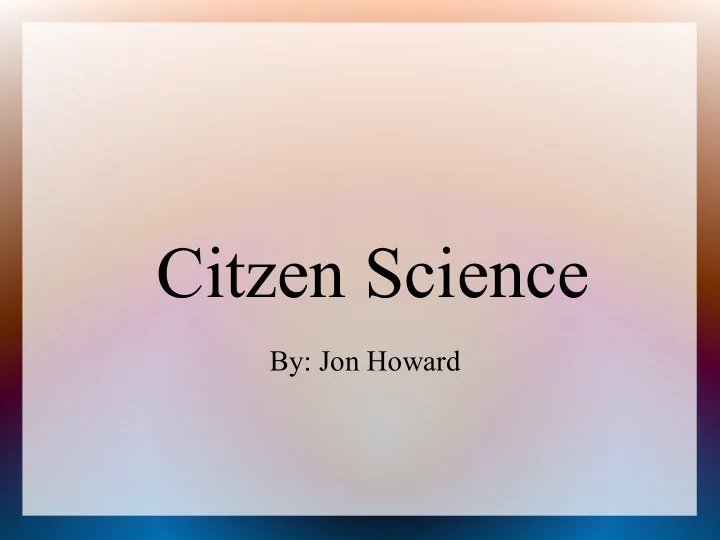

Citzen Science By: Jon Howard
Citizen Sciene Team ● Team (alphabetical): – Paul M. Aoki (Intel Research Berkeley) – R.J. Honicky (U.C. Berkeley) – Ben Hooker (Art Center College of Design) – Alan Mainwaring (Intel Research Berkeley) – Chris Myers (Isopod Design) – Eric Paulos (Intel Research Berkeley / CMU) – Sushmita Subramanian (Intel Corporation) – Allison Woodruff (Intel Research Berkeley)
Citizen Science Team ● With support and collaboration from: – Intel Research – City of San Francisco – U.C. Berkeley Professors
What is Citizen Science? ● Shift in mobile phone usage – From communication tool – To "networked mobile personal measurement instrument". ● Explore how these new “personal measurement instruments” enable an entirely novel and empowering genre of mobile computing usage called citizen science.
Goal ● Through the use of sensors paired with personal mobile phones, everyday people are invited to participate in collecting and sharing measurements of their everyday environment that matter to them.
Hypothesis 1)Improve the science literacy of everyday citizens through active participation in basic scientific principles 2)Provide professional scientists with access to richer, finer-grain data sets for modeling and analysis
Hypothesis 3)Create new experiences and usage models for the mobile phone as a tool for grassroots participation in government and policy making 4)By choice of sensors and software create a deeper and more informed understanding and concern for our climate and environment - hopefully effecting positive societal change
Mobile Phones ● They go everywhere we do. ● However, currently, only tell us very little about out enviroment.
What could a mobile phone tell us? ● What is the current temperature? ● Which way is the wind blowing? ● What is the pollen count? ● Is this water safe to drink?
Information availible on a mobile phone ● Internet – General information – Not for your specific location
Interactive Information ● What if you had asthma and wanted to know which way to work would have the least exposure to pollen. ● What if your gps navigation software could gather that data from other who publish it and create a route for you.
● Mobile phones are allowing us to communicate with each other. ● What if we could extend this communication tool to use as a personal measurement instrument.
Goals extended ● Study different mobile devices outfitted with novel sensors. ● Want to create new communication paradigms that allow non-experts to provide information that allow for positive societal change.
Working with San Francisco ● In a recent trial in collaboration with the City of San Francisco. – Airquality sensor systems on the municipal fleet of street sweepers
Working with San Francisco ● Street sweepers use water sprays, brooms and collection bins to clean off city streets. ● By instrumenting the street sweepers fewer vehicles need to be instrumented. ● Also since the street sweepers clean alot of the streets provides extensive and systematic coverage.
Sensor
Sensor ● Concerns – Street sweeper emissions effecting the sonsor – Needs airflow – Protection from water, dirt, and possible tree branches
Unit Mounted
Data collection ● CO ● NOx ● O3 ● Temperature ● Humidity ● GPS
Video1 Video2 Ozone Video Temperature Video
● Bluetooth Air Quality Sensor
Google Maps Gradient Map
Proposed System
West Oakland Handheld Study
Related Work ● A collection of several inspirational projects: ● Urban Sensing (CENS / UCLA) ● SensorPlanet (Nokia) ● AIR (Preemptive Media) ● SenseWeb (Microsoft) ● The Urban Pollution Monitoring Project (Equator UK)
Recommend
More recommend